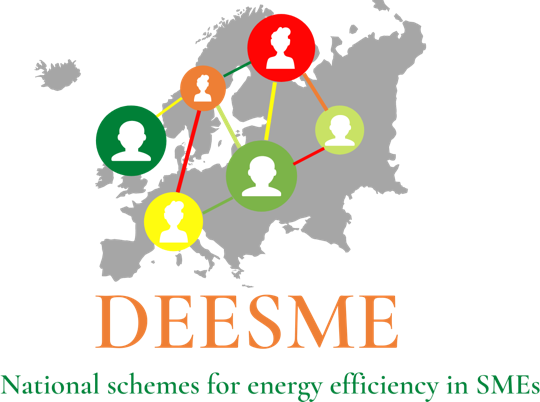Supporting national authorities in enhancing the uptake and implementation of energy audits and energy management systems
The DEESME projects aims to enable the National Authorities (NAs) of selected Member States (MS) of the European Union or their national implementing bodies (IBs) to enhance the uptake and implementation of energy audits and/or management systems within companies according to Article 8 of the Energy Efficiency Directive (EED).
This article compiles a series of four documents elaborated in the DEESME project.
#1: Inventory of needs and requirements
In a first document, the current implementation of the requirements of Article 8 was investigated in detail. The core result was a list of needs and challenges relating to the implementation of Article 8 in the individual MS.
#2: Requirement-based report on best-practice
Based on this list, a second document (#2) laid the ground for developing proposals on how to respond to the identified challenges. For this purpose, current practices in the MS and suggestions from the previous phase concerning these challenges were investigated. This review served to establish a repository of practices for overcoming the challenges.
#3: Generic guideline on best-practice
Thereafter, a third document (#3) was created as a generic guideline that sorts the various best practice blocks and suggests a structure to develop support material for the national NAs/IBs.
#4: Set of national guidance documents
Based on the third document, a series of ten support documents (#4) were developed in local language for the targeted MS. These documents suggest changes compared to the currently implemented approaches, i.e. it seeks to translate the generic suggestions to the national context in a concise manner.
The support documents address challenges in the national implementation of Art. 8 EED per country.
They are derived from a generic guidance document (see appendix) that aims to support the NAs in the Member States of the European Union in the implementation of Art. 8. The generic document is structured along 11 challenges: 6 with a focus on non-small and medium-sized enterprises (non-SMEs) requirements according to Article 8 EED, and 4 with a focus on encouraging small and medium-sized enterprises (SMEs). In addition, the potential benefits of considering non-energy benefits (NEBs) of energy efficiency are also covered. For each challenge, sub-challenges were derived, for which specific solution strategies are presented. A separate page is dedicated to each solution strategy, in which there is a checklist that may support the reflection of NAs, as well as good practice examples intended as inspiration. Further information on the country practices is provided via links to external sources.
The country-specific documents summarize the challenges identified per country and based on elements from the generic guideline, it seeks to make suggestion how to address these challenges. Both the generic guideline and the specific documents are targeted at implementers in the NAs (ministries and/or implementing bodies) and shall help them to reflect upon established implementation processes and to consider potential solutions as realized in other Member States. Yet they cannot and do not claim to provide prescriptive solutions, but they shall serve as an impetus for reflection and to help exploring potential solutions.
The specific guideline contains the following elements:
- An introductory overview of the national transposition in the country
- A summary of country-specific challenges as identified in earlier works in the DEESME project
- Solutions strategies based on the generic guideline to address the challenges
- Suggestions for the promotion of energy audits, energy management systems and non-energy benefits from the implementation of the DEESME approach for companies
- Appendix: 93 pg. generic guidance document for national authorities on overcoming challenges in the implementation of Article 8 EED
